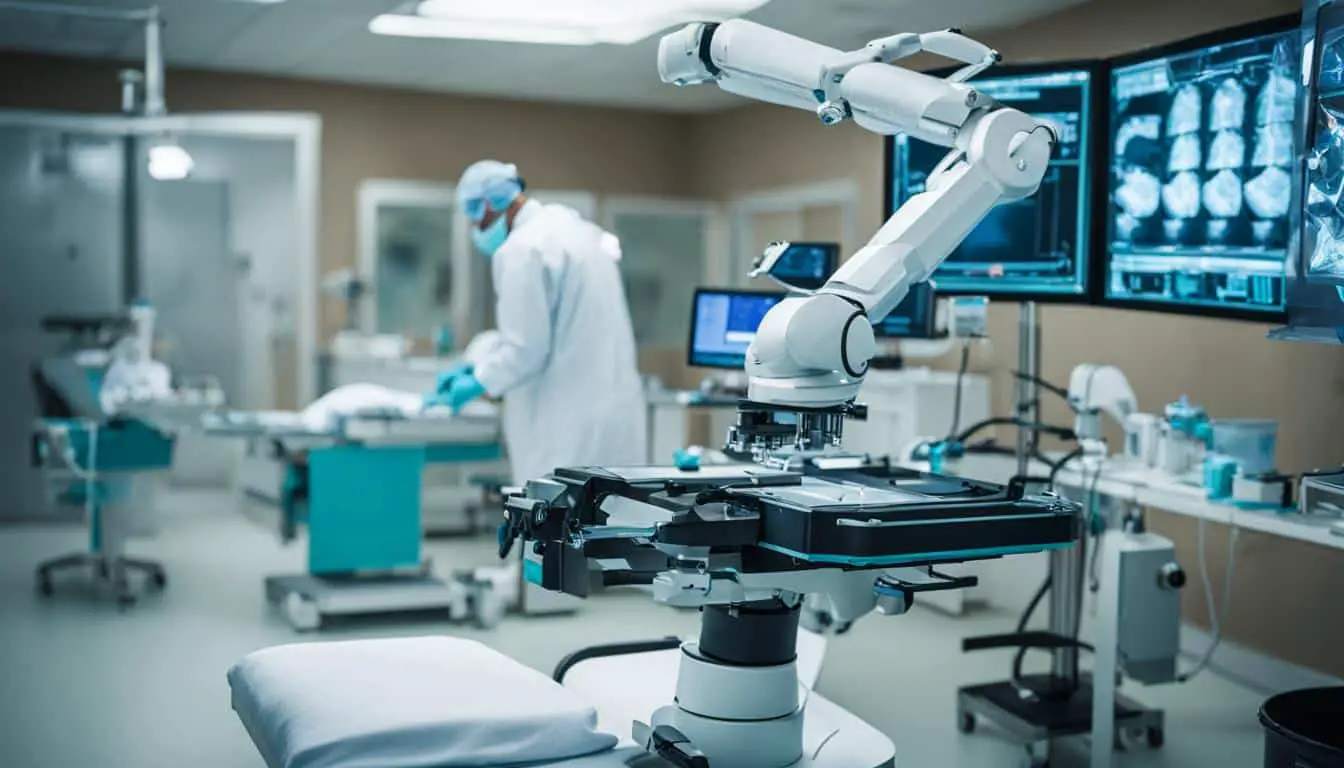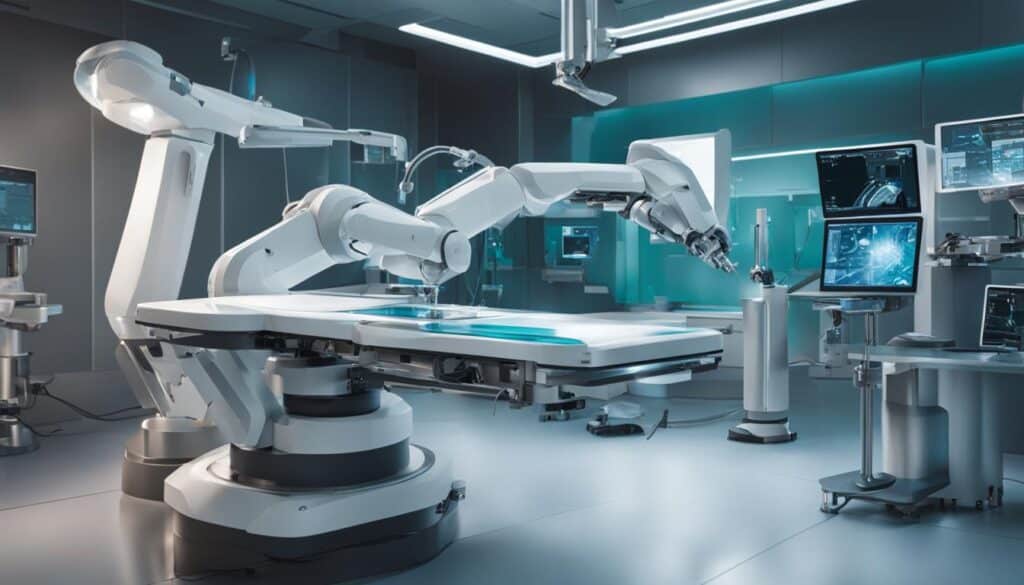
AI-powered robotics is revolutionizing the field of surgery, providing surgeons with cutting-edge tools to enhance their precision and efficiency. These robotic systems assist surgeons in performing complex procedures with greater accuracy and can perform repetitive tasks with high precision. The use of AI-powered robotics in surgery offers numerous benefits, including unparalleled level of precision, minimally invasive surgery, enhanced visualization capabilities, and improved surgical decision-making. AI and robotics are transforming surgical procedures by enhancing precision and efficiency.
Key Takeaways:
- AI-powered robotics in surgery enhances precision and efficiency.
- Robotic systems assist surgeons in performing complex procedures with greater accuracy.
- AI-powered robotics enable minimally invasive surgery.
- Enhanced visualization capabilities improve surgical outcomes.
- AI-driven surgical decision-making leads to improved patient care.
The Impact of AI in Diagnostic Specialties and Predictive Analytics
AI-powered robotic systems are revolutionizing the field of surgery, not only in terms of precision and efficiency but also in diagnostic specialties and predictive analytics. These advancements in AI technology are transforming the way we approach diagnosis and surgical decision-making.
In diagnostic specialties such as radiology, pathology, and dermatology, AI-based tools are enhancing accuracy and efficiency. These tools utilize machine learning algorithms to recognize patterns, classify images, and detect objects, providing doctors with valuable insights for accurate diagnoses. With AI’s ability to process large amounts of data quickly, doctors can make more informed decisions, leading to improved patient outcomes.
Furthermore, AI has the potential to revolutionize surgical decision-making through predictive analytics. By analyzing vast amounts of patient data, AI algorithms can assess risks, predict surgical outcomes, and develop robust risk models. This enables surgeons to better plan and prepare for procedures, leading to safer and more successful surgeries.
AI in surgical automation and robot-assisted procedures is paving the way for more precise and efficient surgeries.
In addition to its impact on diagnosis and surgical planning, AI is also playing a crucial role in intraoperative assistance and medical education. AI-powered robotic systems can provide real-time guidance and execution of simple tasks during surgery, enhancing surgical precision and reducing the risk of human error. These systems can map out surgical approaches and offer real-time information to guide surgeons in laparoscopic and robotic surgeries.
Furthermore, AI has the potential to transform medical education by serving as a learning tool. AI algorithms can track surgeons’ performance, analyze their decision-making processes, and provide real-time information during operations. This allows for continuous learning and improvement, leading to better surgical outcomes and more advanced medical training.
Overall, the impact of AI in diagnostic specialties and predictive analytics is significantly enhancing the field of surgery. By improving accuracy in diagnosis, enabling predictive surgical planning, and providing real-time guidance during surgery, AI-powered robotic systems are revolutionizing healthcare and paving the way for more precise and efficient surgeries.

Table: Key Benefits of AI in Surgery
| Benefits | Explanation |
|---|---|
| Enhanced Precision | AI-powered robotic systems offer unparalleled precision in surgical procedures, reducing the risk of human error. |
| Minimally Invasive Surgery | Robotic surgery techniques enable smaller incisions, leading to faster recovery times and reduced scarring for patients. |
| Improved Surgical Decision-Making | Predictive analytics and AI algorithms aid surgeons in making more informed decisions based on patient data and risk assessments. |
| Enhanced Visualization | AI-powered imaging and diagnostic tools provide surgeons with enhanced visualization capabilities during complex procedures. |
AI’s Role in Intraoperative Assistance and Medical Education
The field of surgical robotics has witnessed a significant transformation with the integration of artificial intelligence (AI). In today’s advanced healthcare landscape, AI plays a crucial role in providing guidance and assistance during robot-assisted surgeries. By leveraging AI algorithms, robotic surgical instruments can map out surgical approaches, guide surgeons, and streamline procedures, ultimately enhancing surgical precision and patient outcomes.
One of the key benefits of AI in surgery is its ability to offer real-time information and guidance during laparoscopic and robotic procedures. AI-powered systems provide surgeons with up-to-date data and insights, enabling them to make informed decisions and perform complex tasks with greater accuracy. This intraoperative assistance ensures that surgeons have access to vital information at their fingertips, ultimately improving surgical outcomes.
Furthermore, AI has the potential to revolutionize medical education and training. As a learning tool, AI can track and analyze a surgeon’s performance during operations, providing valuable feedback and opportunities for improvement. It serves as a virtual mentor, providing real-time information and guidance to aspiring surgeons, thereby accelerating the learning curve and fostering excellence in surgical practice.
It is important to note that while AI augments the decision-making and execution skills of surgeons, it is not intended to replace them. The expertise and experience of surgeons remain invaluable in the operating room. The future of AI and robotic surgery holds tremendous promise, with ongoing advancements and continued collaboration between technology and healthcare professionals. As surgical robotics continue to evolve, we can expect AI to play an increasingly prominent role in enhancing precision, efficiency, and patient care.
FAQ
What are the benefits of using AI-powered robotics in surgery?
AI-powered robotics in surgery offer numerous benefits, including an unparalleled level of precision, minimally invasive surgery, enhanced visualization capabilities, and improved surgical decision-making.
In which specialties is AI-based tools primarily used?
AI-based tools are primarily used in diagnostic specialties, such as radiology, pathology, and dermatology, to improve accuracy and efficiency in diagnosis.
How can AI enhance surgical decision-making?
AI can enhance surgical decision-making through predictive analytics. By analyzing large data pools, AI can help assess risks, predict outcomes, and develop more robust risk models for surgical procedures.
What role does AI play in providing guidance during surgery?
AI-based surgical systems can map out surgical approaches, guide surgeons, and streamline procedures, enhancing surgical precision.
How can AI revolutionize medical education and training?
AI has the potential to revolutionize medical education and training by serving as a learning tool, tracking performance, and providing real-time information during operations.
Will AI replace surgeons in the future?
While AI augments the decision-making and execution skills of surgeons, it is not intended to replace them. Surgeons will still play a crucial role in surgical procedures.
What does the future hold for AI and robotics in surgery?
The future of AI and robotics in surgery looks promising, with ongoing advancements and continued collaboration between technology and healthcare professionals.
Source Links
- https://www.technology-innovators.com/robotics-in-surgery-precision-and-efficiency-in-the-operating-room/
- https://ts2.space/en/the-revolution-of-ai-powered-robotics-in-surgery-enhancing-precision-and-efficiency/
- https://www.facs.org/for-medical-professionals/news-publications/news-and-articles/bulletin/2023/june-2023-volume-108-issue-6/ai-is-poised-to-revolutionize-surgery/








